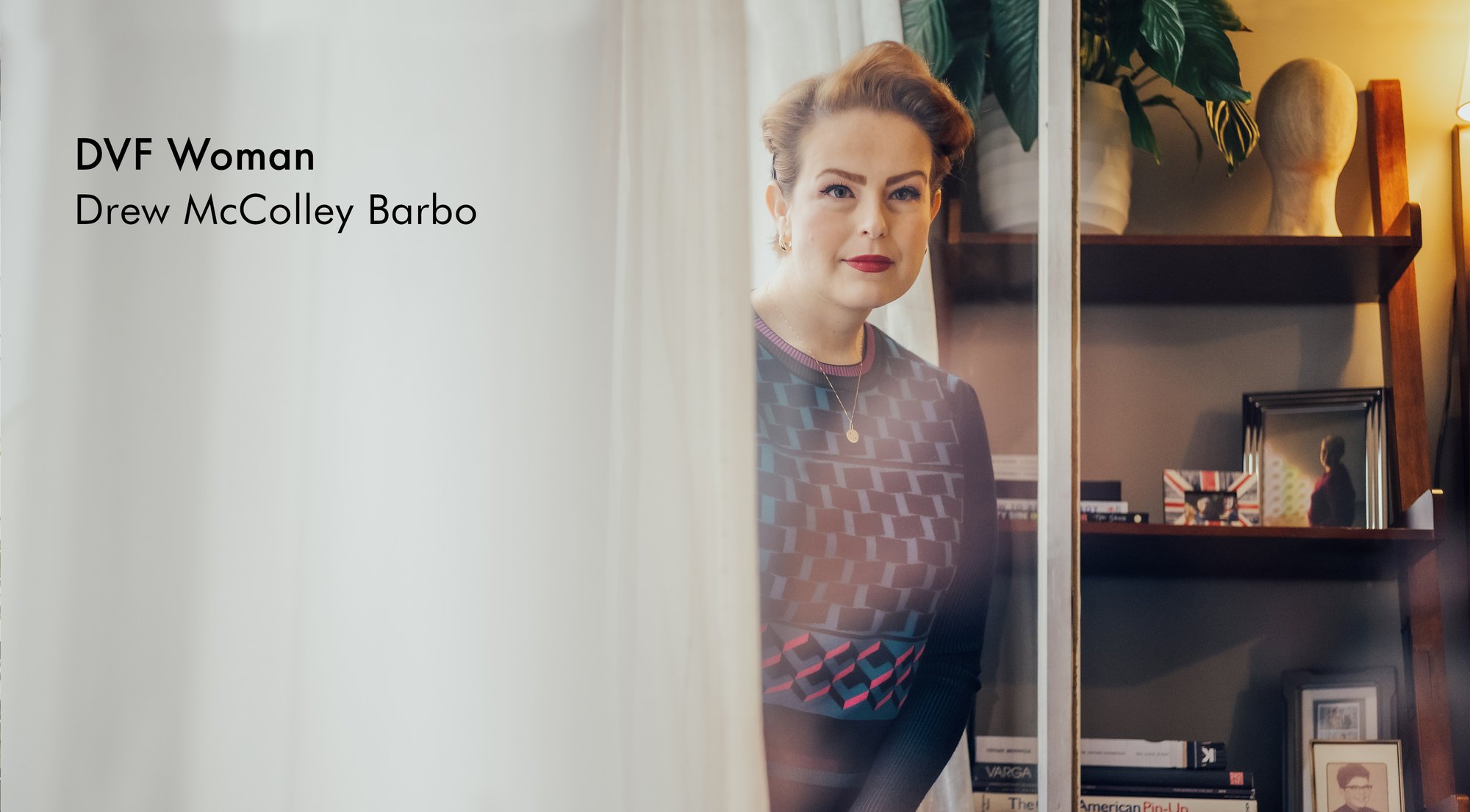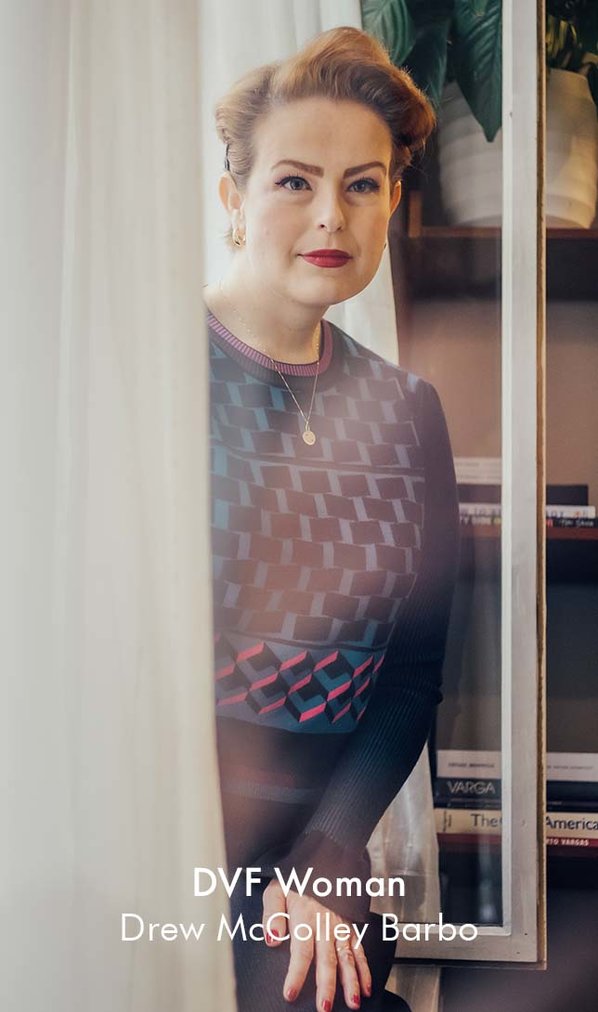

Working Through It
Drew McColley Barbo is an Oslo-based Texan, vintage clothing enthusiast, world traveler, and breast cancer thriver. Like many people, she wasn’t always clear on her vocation in life, which actually opened her up to many different experiences. After building her career in New York as an art dealer, she switched fields and quickly moved up the ladder in tech, and is now working as the VP of Sales at grunt.pro, a Norwegian start-up. Here, she walks us through her career and identity trajectory as well as practicing body positivity while living with a terminal illness.
A turning point in Marielle’s life happened when she was 11 and her mother began to exhibit signs of mental illness and, on a bus ride back from the beach, these symptoms came to a boiling point. Marielle and her older sister were with their mom when she stood up and asked the bus driver to stop so she could use the restroom. He obliged, she got off and came back. She proceeded to do this a few more times until the bus driver grew frustrated and told her he couldn’t stop the bus so many times as they were on a schedule. She then stormed off, leaving Marielle and her sister alone as the bus driver continued his route. This was the beginning of what would be a long-term struggle with Bipolar Disorder.
Spinning Strife Into Gold
Spinning Strife Into Gold
Marielle Miller, Consultant at BCG and Head of Strategic Planning at the streaming start-up Sensical, has managed to work through the challenges of her youth by way of asking questions, conducting research, and spinning her observations to create a positive impact for others.
Working Through It
Drew McColley Barbo is an Oslo-based Texan, vintage clothing enthusiast, world traveler, and breast cancer thriver. Like many people, she wasn’t always clear on her vocation in life, which actually opened her up to many different experiences. After building her career in New York as an art dealer, she switched fields and quickly moved up the ladder in tech, and is now working as the VP of Sales at grunt.pro, a Norwegian start-up. Here, she walks us through her career and identity trajectory as well as practicing body positivity while living with a terminal illness.
Anyone who knows me knows that Texas is deep in my soul. No matter where I go, I play country music and seek out the best taco joints in town. To me, Texas means good family values with a touch of spicy wild freedom. My father likes to tell a story about a family dinner when I was about 8 years old. We were discussing the next family vacation, and I told him I wanted to go to Paris. When he asked “why”, I told him I wanted to see the Mona Lisa at the Louvre—he was shocked that an 8-year-old knew what or where that was. I think that story is a good way to illustrate my relationship to where I was brought up. While Texas is so much of who I am, I always felt compelled to be, see, experience more of the world than where my roots were.
Since I left home at 18, I’ve lived in Paris, London, New York, and traveled everywhere in between—and I’d do it again. Seeing the world helped me create meaningful relationships with interesting people and, most importantly, it expanded my worldview. I became more empathetic and understanding as a result. Moving to Norway would make it my third time living abroad. For anyone considering an international move, I would say do it! You’ll never regret it. Don’t get bogged down in the little things like where you’ll live or the visa paperwork. That all fades into the background when you have rich experiences.
Since I left home at 18, I’ve lived in Paris, London, New York, and traveled everywhere in between—and I’d do it again. Seeing the world helped me create meaningful relationships with interesting people and, most importantly, it expanded my worldview. I became more empathetic and understanding as a result. Moving to Norway would make it my third time living abroad. For anyone considering an international move, I would say do it! You’ll never regret it. Don’t get bogged down in the little things like where you’ll live or the visa paperwork. That all fades into the background when you have rich experiences.
Realizing what I was meant to do didn’t happen immediately.
Like many women, it has definitely been a journey. I’ve had several moments (especially in my twenties) where I thought I was on track to becoming who I was supposed to be—being the edgy art dealer or a highly-paid tech person. But those moments were all likely based on what I felt was “cool” at the time and, since then, I’ve evolved towards following what feels more authentic to who I am.
When I look back on my life, I realize I’ve always helped guide people even in non-professional settings—like tutoring fellow classmates when I was younger or encouraging my single guy friend to build up the nerve to ask his crush out on a date. I realized my calling was ultimately to help people find themselves just like I was able to find myself. I found my purpose while managing a large team of entry level sales reps. I learned I could mentor them, coach them, and help them not only build their professional careers, but find who they were as young adults.
In meeting new people, especially in a new country, it’s been hard to figure out when to tell them I have a terminal illness. It’s a learning curve I’ll probably be learning for a while. At the moment, I’m living with Stage 4 metastatic breast cancer. The doctor has told me I’ll be lucky to see the age of 40 (I’m currently 33). What I’ve learned over the last four years of having cancer, is that I don’t want it to define me. Yes, it’s a large part of my life, but when people think of me, I want them to think of the woman I am, not the sickness I have.
What’s been difficult for me is balancing fearlessness and vulnerability, learning when to act strong and when to speak about, look, or be openly sick. Vulnerability in so many ways is a strength too, and saying “I’m not okay,” has actually made many of my relationships stronger because my friends and family can support me.
Normally, I would describe myself as body-accepting. I’ve never worried too much about how I ate or if I went up and down in weight a few pounds. I was given the body I have, so I lived with it, loved it, and embraced it. But in the last few years, that perspective for me has changed because the body I once accepted is no longer loving me back. In fact, my body is trying to attack and kill me. When I think of accepting my body, it’s no longer about the physical look of my figure or fitting into a dress. Accepting my body now means I have to accept that my body doesn’t function properly and that it slows me down, forcing me to find a new pace.
As someone who wants to push myself hard every day, that’s been very challenging. But living independently means to me I will face that journey, rehabilitate where I can, and accept where I can’t. While it’s cliché, the most important thing I’ve learned on this journey is that time is precious. I want to spend the time I have with the people I love, checking off items on my bucket list, and truly living. Since my diagnosis, I’ve traveled far distances to spend time with the people that mean the most to me. I’ve gotten married (and will be hosting the wedding post-CoVid next year in Italy), moved to Norway, started a new job for a team here in Oslo I absolutely respect and adore, and have bought a home. My friends and family have been brilliant, helping me make the most of what time I have, and I couldn’t be more thankful.
I was asked one of Diane’s favorite questions: Do you ever feel like a loser? My answer is that life isn’t a black and white game of losing and winning. We all have things that make us happy and things that drag us down, and we all have to create our own measures of success.
I’ve lost a lot in the last several years… my right breast, my hair, my youth. However, I’ve gained perspective, patience, and empathy—all things that would not have come without that loss. I also know I wouldn’t have been married to my husband without journeying through this cancer battle together. Having a common enemy and fighting together made us stronger. So no, I don’t feel like a loser. But I do feel like a survivor.
Follow Drew @retro_tex and read her latest Medium piece here.
The photographer for this shoot was Ilja C. Hendel, keep up with his work at @ilja_hendel.
